#1 Blockchain Security Services (Trusted by 1000+ Teams)
Secure your smart contracts, DeFi protocols, and blockchain infrastructure with Astra’s expert-led blockchain security services. Our audits combine automated testing, manual code reviews, and real-world exploit simulations to help you prevent hacks, build investor confidence, and prove trust in every transaction.

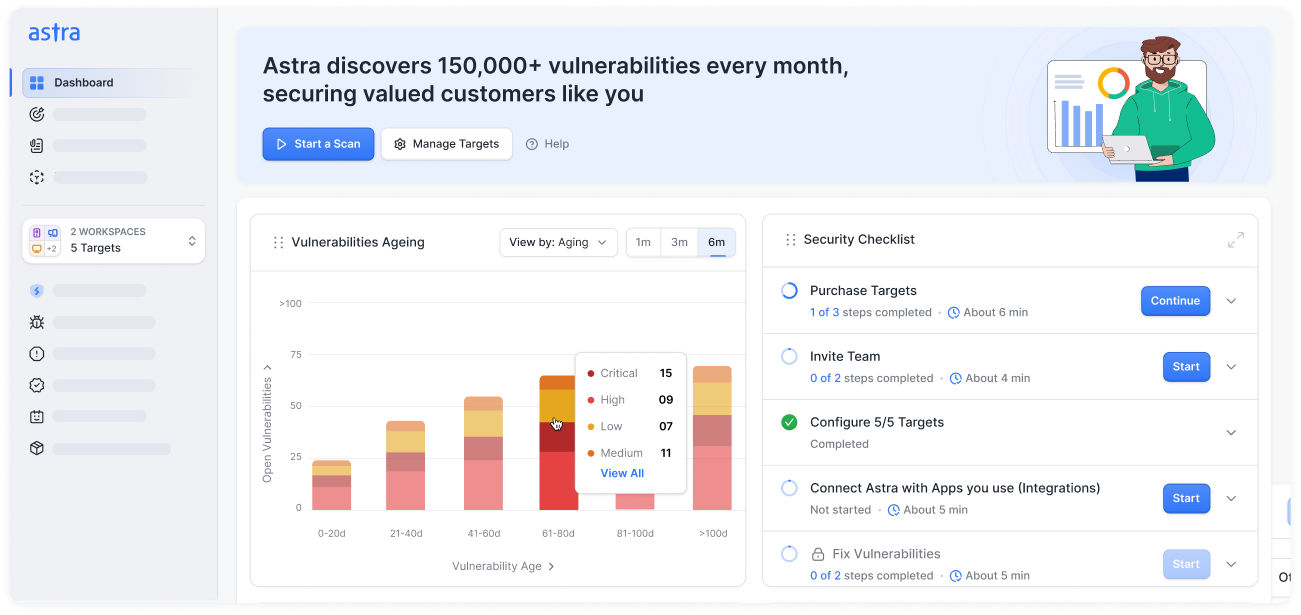










Why choose Astra Security's Blockchain security services?
Experience our audit plans built for modern blockchain and crypto teams with expert-led assessments, smart automation, and continuous risk reduction at scale.
- Focus on real vulnerabilities with noise-free detection logic
- Our experts vet false positives so you don’t waste hours validating noise
- Mark verified issues once to skip them in future audits
- Get expert vulnerability reviews for faster prioritization and compliance readiness
- Cut manual tuning as our AI-assisted blockchain audits adapt tests to your smart contracts and decentralized applications
- Context-aware analysis improves accuracy & guidance with every assessment
- Use machine learning models that evolve from real-world exploit data
- Scale audit coverage without increasing security headcount
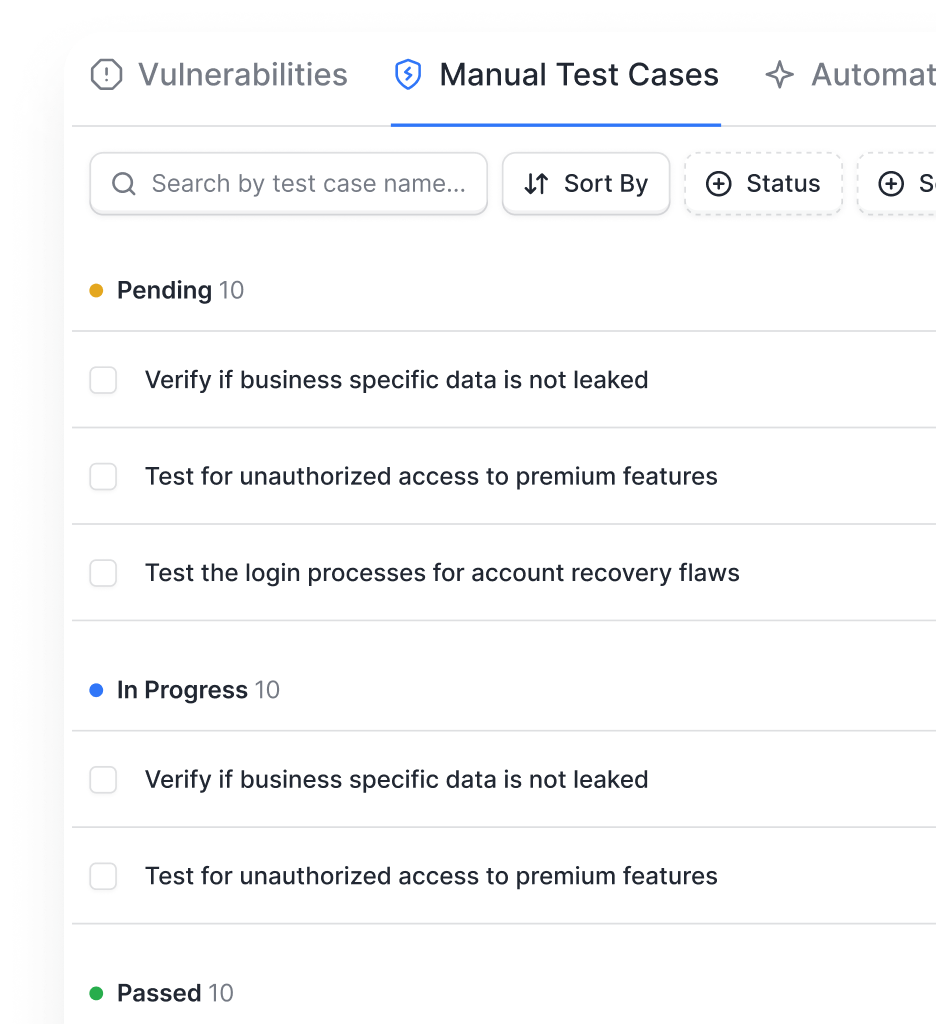
- Get continuous protection across your blockchain infrastructure, including smart contracts, wallets, and nodes
- Avoid alert fatigue with business-impact optimized findings & expert-validated audit checks
- Stay compliant with solution-first reports, verified fixes, and targeted follow-up assessments
- Cut false positives and reduce total cost with managed accuracy audits
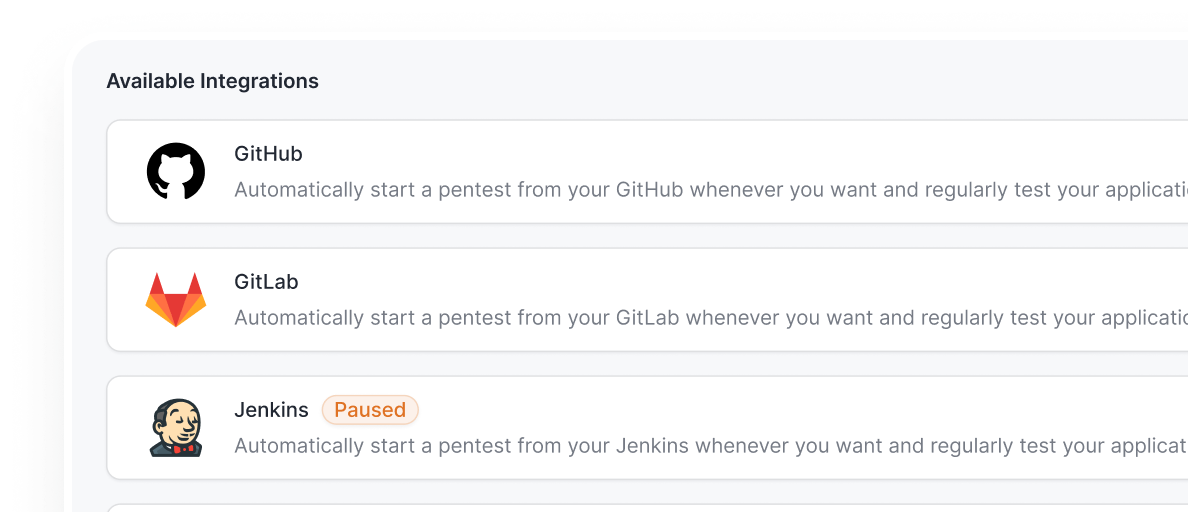
- Integrate assessments seamlessly into your development pipelines and operational workflows with zero disruption
- Automate Slack alerts and JIRA ticketing to cut manual effort
- Shorten your mean time to remediate with seamless vulnerability and compliance workflows
- Maintain network reliability without compromising security
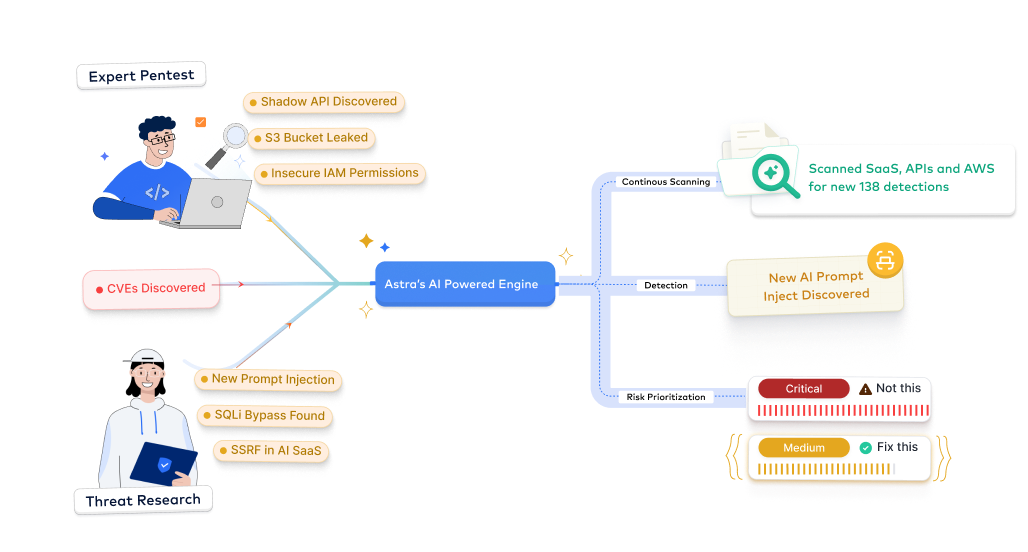
- Generate audit-ready reports for ISO, SOC 2, HIPAA, GDPR, NIST, and blockchain-specific standards
- Accelerate certification with simplified expert-led guidance
- Demonstrate security maturity to stakeholders and investors
- Turn compliance readiness into a business advantage

Identify hidden vulnerabilities, reduce business risk, and secure your smart contracts with expert-led blockchain security audits starting at just $5,999.
Start TrialAstra's 7-Step Pentest Process
How our blockchain security audit services work
Learn how our team delivers smarter protection through expert-led blockchain vulnerability assessments and audits.
Discovery & Scoping
- Identify all in-scope smart contracts, decentralized applications (dApps), nodes, APIs, and integrations for testing.
- Define parameters, environments, and blockchain networks (Ethereum, BSC, Polygon, Solana, etc.) to ensure complete coverage.
- Align the assessment scope with relevant compliance and security frameworks such as SOC 2, ISO 27001, or GDPR.
- Personalized setup to maintain visibility throughout the engagement.
Outcome: Outline a mutually agreed compliance-guaranteed scope and a clear roadmap to blockchain audit readiness.


Authentication Setup
- Establish secure authentication workflows for dApp testing across multiple wallet roles, private keys, and API endpoints.
- Integrate credentials, tokens, and node access configurations to enable deep authenticated coverage.
- Ensure safe testing within testnets or production replicas without disrupting on-chain operations.
- Standardized authentication templates for future audits to streamline recurring security assessments.
Outcome: Get full-depth testing coverage of smart contracts and nodes without risking network continuity.
Automated Baseline
- Run automated scans across smart contracts, APIs, and dApp components to detect reentrancy, overflow, underflow, logic flaws, and misconfigurations.
- Leverage Astra Security’s tuned detection engine built for blockchain ecosystems to ensure comprehensive baseline coverage with minimized false positives.
- Correlate automated findings with prior assessments to maintain historical visibility and improve audit readiness.
- Deliver continuous monitoring data supporting ongoing blockchain compliance and risk management.
Outcome: Gain a comprehensive, continuous threat baseline ready for immediate on-chain action and reporting.


Manual Audit & Risk Scoring
- Our experts manually validate automated findings, exploit potential logic flaws, simulate attack vectors (reentrancy, flash loan, oracles, etc.), and deliver prioritized fixes.
- Evaluate each finding based on exploitability, economic impact, and compliance relevance.
- Apply contextual CVSS scoring tailored for blockchain environments to prioritize remediation based on smart contract risk exposure.
- Generate clear risk summaries to guide both technical and executive decision-making.
Outcome: Receive prioritized, actionable risk intelligence focused on blockchain and business impact.
Remediation Support
- Deliver detailed, developer-focused remediation steps validated by our blockchain security engineers.
- Provide reproducible PoCs, code-level fixes, and configuration guidance for faster issue resolution.
- Collaborate directly with your developers to verify patch effectiveness and prevent reintroducing vulnerabilities.
- Get documented remediation evidence aligned with compliance and audit requirements.
Outcome: Achieve faster, verified fixes supported by our experts and documented for full blockchain compliance.


Re-Scan & Validate
- Conduct targeted re-audits to confirm successful remediation and eliminate residual risks.
- Schedule recurring scans to detect regressions after smart contract updates or new dApp releases.
- Capture time-stamped validation evidence for audit readiness and investor assurance.
- Maintain a verified blockchain security baseline that demonstrates continuous improvement over time.
Outcome: Secure a certified, publicly verifiable certificate proving continuous blockchain security assurance.
From startups to fortune companies,
1000+ companies trust Astra












































.webp)





Experience zero false positives and seamless integrations with Astra’s blockchain security audit service
Request Pentesting ServicesTypes of blockchain security services
Complete audit and assessment solutions to help you secure every layer of your blockchain ecosystem, from smart contracts to node infrastructure.

Smart Contract Security Audits
- Uncover logical flaws, reentrancy bugs, and economic vulnerabilities in smart contract code
- Validate contract logic against intended business outcomes and security best practices
- Receive actionable audit reports and re-verification after every fix

Blockchain Infrastructure Audits
- Assess blockchain nodes, APIs, and wallet infrastructure for configuration and access control weaknesses
- Identify consensus manipulation risks, API key exposure, and DDoS resilience issues
- Ensure alignment with frameworks like CIS, NIST, and ISO 27001

DeFi Protocol Security Audits
- Simulate real-world attack vectors on liquidity pools, staking mechanisms, and tokenomics
- Detect flash-loan vulnerabilities, oracle manipulation, and governance exploits
- Ensure economic security and long-term sustainability of decentralized ecosystems

Private & Enterprise Blockchain Audits
- Audit Hyperledger, Quorum, and enterprise blockchain networks for architecture and policy gaps
- Evaluate node security, access management, and chaincode implementation
- Accelerate compliance readiness for GDPR, SOC 2, ISO 27001, and industry-specific frameworks

Wallet & Exchange Security Audits
- Assess custodial and non-custodial wallets for encryption, seed management, and API exposure
- Audit exchanges for authentication flaws, liquidity manipulation, and user data protection
- Ensure resilience against both internal and external threat vectors
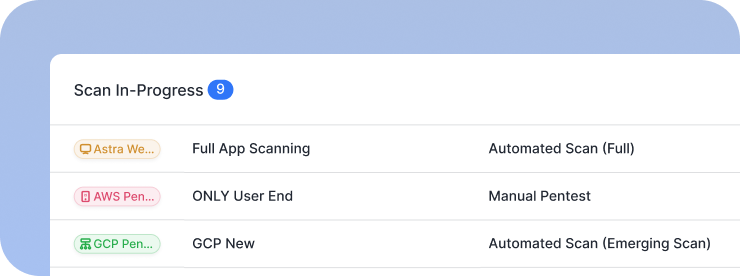
Continuous Security Monitoring for Blockchain
- Implement real-time monitoring for transaction anomalies, smart contract exploits, and node integrity
- Get proactive alerts for unusual patterns and automated re-audit scheduling
- Maintain compliance and user trust with continuous security visibility





Strengthen your blockchain ecosystem with end-to-end security audits trusted by global Web3 leaders.
Book a DemoAstra Security vs traditional vendors
See how our modern approach to blockchain security services outpaces traditional vendor models.
Experience the Astra Security difference: faster, smarter, compliance-ready pentesting.
Pentesting as a service, tailored for your industry
Continuous penetration testing and compliance mapping services built for ISO, SOC 2, HIPAA, PCI DSS, and more.

- Secure financial systems and payment workflows from logic flaws
- Deliver actionable fixes and maintain PCI DSS, ISO 27001, SOC 2, DORA compliance, and more
- Standards: OWASP, PTES, CVSS

- Protect patient data and secure APIs across web, mobile, and cloud
- Uncover hidden PHI exposures and validate HIPAA, ABHA, and more
- Standards: OWASP, PTES, NIST, CVSS

- Accelerate app security with DevSecOps integration and continuous scans
- Detect vulnerabilities with AI-driven validation and ensure ISO 27001, SOC 2, GDPR compliance and more
- Standards: OWASP, PTES, CVSS, NIST SP 800-115

- Protect customer data and secure payment flows from BOLA/IDOR risks
- Empower developers with guided remediation and PCI DSS, ISO 27001, SOC 2 compliance and more
- Standards: OWASP, PTES, CVSS

- Fortify cloud, container, and on-prem systems with authenticated tests
- Monitor and validate vulnerabilities to prevent downtime; comply with NIST, ISO 27001, SOC 2, CREST, Cert-In, and more
- Standards: OWASP, PTES, NIST, CVSS

- Discover shadow APIs and secure cloud services
- Deliver fast, developer-friendly fixes; ensure GDPR, ISO 27001, SOC 2 compliance
- Standards: OWASP, PTES, CVSS
Identify hidden vulnerabilities, reduce business risk, and secure your smart contracts with expert-led blockchain security audits starting at just $5,999.
Start TrialOur pentesters? World class, certified & contributors to top security projects
We find the bugs before the bad guys do
Our team stays ahead of the curve in the ever-evolving world of web security

.avif)
.avif)
.avif)




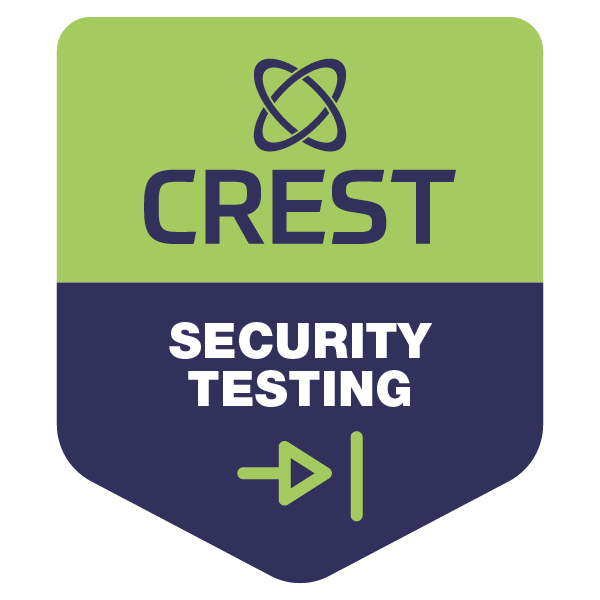
Stay compliant throughout the year
Understand our industry-specific pentests as a service plans designed to meet your compliance, scale, and security needs.
- Get compliance-ready year-round for ISO 27001, SOC 2, GDPR, HIPAA, PCI DSS, CREST, CERT-In, CIS Controls, NIST, & more
- Receive actionable insights from continuous pentesting and expert-led remediation guidance
- Track compliance progress with the Astra Security Compliance View, providing executive-friendly and technical views

- Monitor for smart contract exploits, oracle manipulation patterns, new CVEs, and on-chain anomalies.
- Identify and remediate risks in real time through automated scanners, behavior detection, and expert validation.
- Monitor your blockchain ecosystem dynamically with the Astra Security Vulnerability View, showing trends, exploit attempts, and remediation status.

- Maintain audit-ready reports without manual effort
- Reduce risk exposure with real-time detection and validation
- Prioritize remediation based on business impact and compliance requirements
- Demonstrate security maturity to clients, regulators, and internal stakeholders


Frequently asked questions
What are blockchain security services?
Blockchain security services audit smart contracts, nodes, wallets, and DeFi protocols to find logic bugs, economic vulnerabilities, and infrastructure misconfigurations, helping teams prevent exploits and demonstrate security to stakeholders.
What are the benefits of blockchain security audits?
They reduce exploit risk, protect funds and user assets, improve investor and user trust, and provide documentation required for regulatory and commercial trust-building.
How much do blockchain audits cost?
Pricing depends on contract complexity, number of contracts, and infrastructure scope. Simple scans start at $69; full smart contract audits and enterprise blockchain assessments typically start at $5,999. Custom quotes are available for complex DeFi systems.
Can you provide a custom audit for my smart contracts or DeFi protocol?
Yes. We tailor audits to your codebase, protocol logic, and operational infrastructure, covering tokenomics, oracles, bridges, and governance mechanisms as needed.
Will your blockchain audits help with compliance and investor assurance?
Yes. We map findings to applicable standards and produce audit-ready reports and public attestations that help with investor due diligence and regulatory transparency.
How fast can I expect results?
Timelines vary by scope. Small contract reviews can be completed rapidly; larger protocol audits are scoped with clear milestones and turnarounds. Re-verification is provided after fixes.











